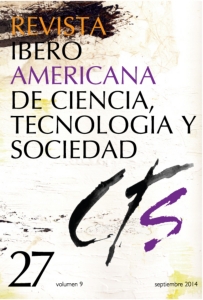Prospects of training and guidance
Contexts of mediation in the universe of digital inclusion
DOI:
https://doi.org/10.52712/issn.1850-0013-578Keywords:
information and communication technologies, digital inclusion, public access, mediation, human mediatorAbstract
This article discusses two perspectives that are usually taken into consideration in digital inclusion projects: training and orientation. The main objective of this paper is to present the monitoring as a key element for enhancing the transformations required by the proposals that focus on inclusion to generate development by means of public access to ICT. We sought to investigate the importance of training and guidance at different points of public digital inclusion. We also analyzed these actions in the context of digital inclusion and under the light of the mediation concept. The research was conducted in the northeastern cities of Brazil with the greatest potential for digital inclusion. As a result, this paper illustrates the situation of perspectives based on solid training and guidance in the context of digital inclusion in these cities. We conclude signaling aspects that denote the importance of thinking for mediation programs and projects aimed at digital inclusion and the two main causes that impact the monitoring (human mediation).
Downloads
References
BANCO MUNDIAL (2006): Relatório do desenvolvimento humano 2006: poder, pobreza e a crise mundial da água, Brasília.
VIANNA, H. (2011): “Internet e inclusão digital: apropriando e traduzindo tecnologias” em A. Botelho y L. M. Schwarcz (orgs.): Agenda brasileira: temas de uma sociedade em mudança, São Paulo, Companhia das Letras, pp. 314-323.
BRASIL (2006): Ministério das Comunicações, Brasília. Em: http://www.idbrasil.gov.br.
COELHO NEVES, B. (2010): “Análise das políticas de informação: sociedade da informação com foco na inclusão digital do global ao local”, Revista Iberoamericana de Ciencia, Tecnología y Sociedad -CTS, vol. 5, nº 15, pp. 111-131.
COELHO NEVES, B. (2011): “Formação e orientação: aspectos da mediação no universo da inclusão digital”, Revista Inclusão Social, Brasília, vol. 5, nº 1, p.44-57.
DEMO, P. (2002): O Charme da exclusão social, Campinas, Autores Associados.
DEMO, P. (2009): Educação Hoje – “Novas” tecnologias, pressões e portunidades, São Paulo, Atlas.
VAN DIJK, J. A. G. M. (2005): The Deepening divide: inequality in the information society, Thousand Oaks, Sage Publications, p. 240.
THOMAS, M. (2011): Deconstructing Digital Natives: Young people, Technology and the new literacy, Londres, Routledge.
UNESCO e CETIC BR. (2014): Indicadores e estatísticas TIC para o desenvolvimento. Centro Regional de Estudos para o Desenvolvimento da Sociedade da Informação, Brasília.
VYGOTSKY, L. S. (2007): A Formação Social da Mente: o desenvolvimento dos processos psicológicos superiores, São Paulo, Martins Fontes, p. 224.
WARSCHAUER, M. (2006): Technology and social inclusion: rethinking the digital divide, MIT. Em: http://www.mitpress.mit.edu/catalog/item/default.asp?sid= BAC81CFA-2B4A-44FF.html.
WARSCHAUER, M. (2007): Laptops and Literacy: learning in the wireless classroom, New York, Teaches College Press.
Downloads
Published
How to Cite
Issue
Section
License
Copyright (c) 2024 CC Attribution 4.0

This work is licensed under a Creative Commons Attribution 4.0 International License.
All CTS's issues and academic articles are under a CC-BY license.
Since 2007, CTS has provided open and free access to all its contents, including the complete archive of its quarterly edition and the different products presented in its electronic platform. This decision is based on the belief that offering free access to published materials helps to build a greater and better exchange of knowledge.
In turn, for the quarterly edition, CTS allows institutional and thematic repositories, as well as personal web pages, to self-archive articles in their post-print or editorial version, immediately after the publication of the final version of each issue and under the condition that a link to the original source will be incorporated into the self-archive.











